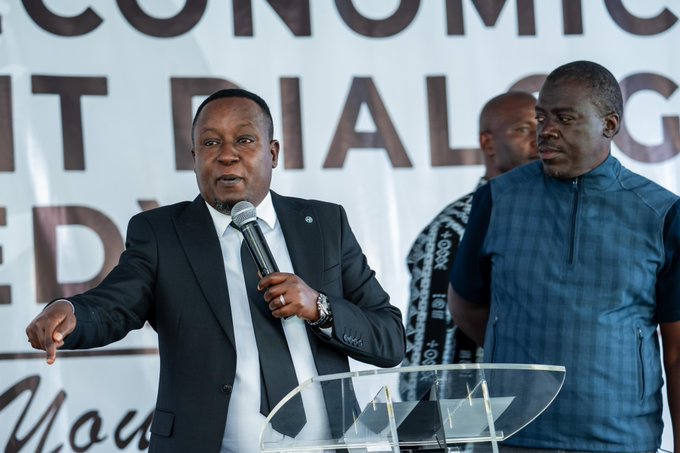Former presidential candidate Joseph Kabuleta has officially launched his new political party, the National Economic Empowerment Dialogue (NEED), at a vibrant gathering in Kampala that drew supporters from across the country. With maize as the party’s symbol, black and white as its official color, NEED aims to bring a new vision to Uganda’s political and economic landscape.
In his speech, Kabuleta positioned NEED as a nationwide movement committed to ending economic injustice, decentralizing power, and restoring financial dignity to Ugandans. He warned citizens against tolerating bad leadership, which he said has entrenched poverty and crippled the private sector.
“This country has suffered under a fat public sector that’s feeding on a thin private sector,” Kabuleta stated. “We must reverse that. We will put the public sector on a diet and grow the private sector to power our economy.”
A New Economic Vision
Kabuleta said Uganda’s wealth must translate to “money in people’s pockets,” a slogan he emphasized repeatedly as a core NEED principle. He criticized the current administration for stifling private enterprise, manipulating the poor, and failing to harness Uganda’s agricultural and industrial potential.
He cited Uganda’s importation of basic goods such as rice, garlic, and groundnuts as examples of “economic stupidity,” blaming leadership for turning Uganda into a consumer economy.
“We have two planting seasons and some of the most fertile land in Africa, yet we import rice from Tanzania and garlic from China. That’s not a production failure—it’s a leadership failure,” he said.
“Museveni Dynasty Must End”
Kabuleta accused President Yoweri Museveni of orchestrating a political dynasty that thrives on poverty and fear. He declared that Museveni’s rule is nearing its end and vowed that Uganda would not become a monarchy.
He told a cheering crowd. “This is not a kingdom. Museveni’s son will not take over. The dynasty ends with him.”
He further argued that President Museveni has intentionally impoverished rural communities so that their votes can be bought cheaply during elections.
“He destroyed the fabric of rural wealth. He made sure village people remained peasants. But we will restore that wealth. It’s not hard to do. We’ve done it before, and we will do it again,” Kabuleta said.
Championing Financial Liberation
Kabuleta shared personal stories and testimonies from Ugandan entrepreneurs who have been forced out of their own businesses through unfair taxation and political interference. He pointed to a “capture” of Uganda’s business environment by elites with political connections, discouraging genuine investors.
National Representation, Not Central Politics
Kabuleta emphasized NEED’s commitment to being a national, not regional, party. He celebrated the presence of delegates from Karamoja, Busoga, and other regions, noting that NEED is fielding candidates in every constituency—including areas historically dominated by the ruling party.
“We are not doing politics only in Kampala or the central region. We are building a national movement. Every region is represented here today,” he said.
Maize: A Symbol of Prosperity
NEED’s party card was officially unveiled during the launch, featuring maize as the party symbol—chosen to reflect agriculture’s role in Uganda’s economy and the party’s focus on food security and rural prosperity.
Kabuleta argued that by strengthening agriculture, cutting unnecessary government spending, and supporting local production, Uganda can drastically reduce its reliance on imports and increase job creation.
“If our farmers are planting the right crops with a guaranteed market, school fees will drop because food prices will drop. That’s how real economic empowerment works,” he explained.
A Call for Grassroots Transformation
In closing, Kabuleta encouraged party supporters to spread the message of NEED across the country and emphasized the urgency of economic transformation through political change.
“We are not just offering slogans. We are offering solutions. And with your help, we shall reclaim this country’s wealth for the people who create it.”




